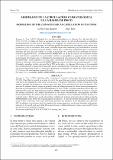Por favor, use este identificador para citar o enlazar este ítem:
https://hdl.handle.net/20.500.12958/4872| Título : | Modelado de la circulación climatológica en la bahía de Pisco |
| Otros títulos : | Modelling of the climatological circulation in Pisco Bay |
| Autor : | Romero, Carlos Yvan Tam, Jorge |
| Palabras clave : | Modelado;ROMS;ROMS2ROMS;Anidamiento;Pisco |
| Fecha de publicación : | jun-2022 |
| Editorial : | Instituto del Mar del Perú |
| Citación : | Romero, C., Tam, J. (2022). Modelado de la circulación climatológica en la bahía de Pisco. Bol Inst Mar Perú. 37(1): 175-190. |
| Citación : | Boletín IMARPE 37(1), 2022; |
| Resumen : | La bahía de Pisco se encuentra en una zona en la cual el afloramiento se manifiesta persistentemente durante todo el año debido a la magnitud del viento cerca de sus costas, con mayor intensidad en invierno y primavera, lo cual hace posible la existencia de una amplia zona costera muy productiva y rica en nutrientes. Esta zona y sus islas adyacentes presentan gran diversidad de recursos pesqueros para el consumo humano directo, motivo por el cual tiene importancia para la pesquería artesanal del Perú. En este trabajo, se realizó el modelado de la bahía de Pisco utilizando el modelo oceánico regional ROMS y la herramienta ROMS2ROMS con el fin de conocer la circulación marina
y la distribución espacial de las principales variables oceanográficas a pequeña escala en la bahía
seleccionada. Para lograr esto, se utilizaron los resultados de una simulación del sistema de corrientes
de Humboldt a escala regional (~12 km), como condiciones de frontera para realizar un downscaling
dinámico utilizando la herramienta ROMS2ROMS para obtener la resolución espacial requerida (~ 1 km). El modelo reprodujo el ciclo estacional de la TSM en la bahía, con algunas diferencias en la intensidad de la TSM simulada y observada. Se encontró que la velocidad de las corrientes va en dirección noroeste con mayor intensidad al sur y al oeste de la península, alcanzando sus valores más altos en primavera (22,5 cm/s) y los más bajos en v erano (7,5 cm/s). ABSTRACT: Pisco Bay is located in an area in which the upwelling persistently manifests throughout the year due to the magnitude of the wind near its coast, with greater intensity in winter and spring, which makes it possible the existence of a wide coastal area that is very productive and rich in nutrients. This area and its adjacent islands present a great diversity of fishing resources for direct human consumption, thus has a great importance for the artisanal fishery of Peru. In this work, the modeling of Pisco Bay was performed by using the Regional Ocean Model (ROMS) and the ROMS2ROMS tool in order to simulate the marine circulation and spatial distribution of the main sub-mesoscale oceanographic variables in the selected bay. To achieve this, the results of a simulation of the Humboldt Current System at a regional scale (~ 12 km) were used as boundary conditions to perform a dynamic downscaling using the ROMS2ROMS tool to obtain the required spatial resolution (~ 1 km). The model reproduced the seasonal cycle of SST in the bay, with some differences between the intensity of the simulated and observed SST. In addition, it was found that the speed of the currents goes in a north-west direction with greater intensity to the south and west of the Paracas peninsula, reaching its highest values in spring (22.5 cm/s) and the lowest in summer (7.5 cm/s). |
| URI : | https://hdl.handle.net/20.500.12958/4872 |
| ISSN : | 04587766 |
| Aparece en las colecciones: | Boletín 37(1) 2022 |
Ficheros en este ítem:
| Fichero | Descripción | Tamaño | Formato | |
|---|---|---|---|---|
| Boletin 37-1 artículo 11.pdf | 978,56 kB | Adobe PDF |  Visualizar/Abrir |
Este ítem está sujeto a una licencia Creative Commons Licencia Creative Commons

